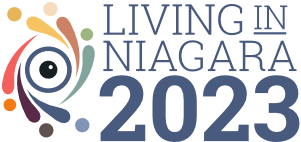The EDI (Early Development Instrument) is largely based on the National Longitudinal Survey of Children and Youth, and other existing tests. The EDI is a population-based measure for communities to gauge school readiness of children at the kindergarten level. The EDI is completed by kindergarten teachers after knowing the child for approximately six months, and is estimated to takes about twenty minutes of the teacher’s time per child. The instrument measures child characteristics by way of a variety of questions related to five developmental domains that have been identified as important in evaluating a child’s readiness for school. These domains are: physical health and well-being social competence, emotional maturity, language and cognitive development, communication skills and general knowledge. The EDI mapping of neighborhoods in Niagara indicate that there are areas in Niagara where the EDI is strong and areas that are suppressed and in need of attention for positive change.
Figure 4.9 Children in Niagara not Developmentally Ready in 2008 in 2 or more domains
Figure 4.10 Changes between 2005 and 2008 by neighborhood
Source: Early Children’s Early Development: Region of Niagara
Other information on education:
Full-day kindergarten (FDK):
FDK has begun to be phased in throughout Niagara over the next 5 years, starting in September, 2010. In the first phase 15% of schools in Niagara were targeted for FDK for 4 and 5 year olds. In phase three, for the September 2012/2013 school year 49% are targeted for implementation. Issues and partnerships are being worked on to develop this program in Niagara. It is anticipated that FDK will have an impact on employment of educators for these programs and an impact on increased opportunities for the education and employment of the parents of these children.
Declining school enrolment:
Many Ontario schools have experienced changing demographics:
- Enrolment in Ontario schools declined by 90,000 students between 2002-2003 and 2008-09.
- Between 2008-09 and 2012-13, enrolment is projected to decline by 56,000 students
- In 2008-09, 57 of 72 school boards had smaller student populations than in 2002-03
- The funding formula has been reformed to introduce specific measures to help boards adjust to this declining enrolment
Source: http://www.edu.gov.on.ca/eng/policyfunding/enrolement/html
Early Years initiatives:
Niagara’s children, in their early years have had the benefit of the dedicated and focused efforts of The Niagara Best Start Network that established 16 early years centres across Niagara. More information is available in the Getting Started in Niagara sector of this report, regarding getting started as a child in Niagara. The Early Years Niagara Planning Council is addressing early years issues of education and poverty for children.
Source: Early Years Niagara Planning Council
The Niagara Best Start Network developed the Integrated Community Plan 2007-08 Source www.earlyyearsniagara.org
In 2009, Early Years Niagara developed the Niagara Children’s Charter Enacted report at www.earlyyearsniagara.org/Niagara_Children’s_Charter_Enacted_web_6.pdf










